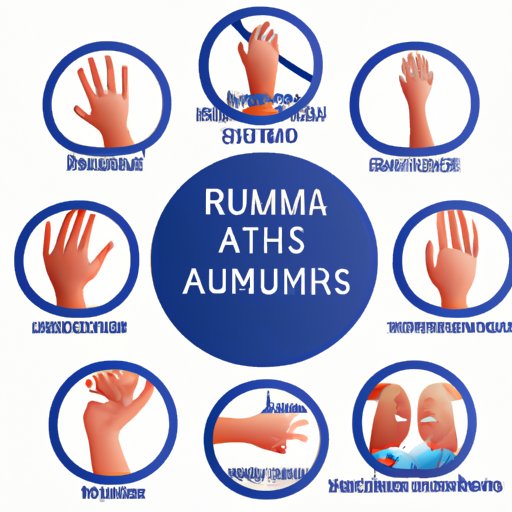
Introduction
Rheumatic disease is a term used to describe a variety of medical conditions that affect the body’s joints, bones, muscles, and connective tissues. Some forms of rheumatic disease are autoimmune disorders, meaning that the body’s immune system attacks healthy tissues and cells by mistake. These diseases are often chronic and can cause significant physical and emotional challenges for those affected. It is essential to understand these conditions and their treatment to manage them effectively. In this article, we will explore the different types of rheumatic diseases, their symptoms and diagnosis, relationship with autoimmune disorders, management of pain and discomfort, current research, myths and misconceptions, and personal stories and perspectives of individuals living with this condition.
Types, Symptoms, and Diagnosis
There are over 100 different types of rheumatic diseases, each with unique symptoms and characteristics. The most common types include osteoarthritis, rheumatoid arthritis, lupus, scleroderma, and gout. Symptoms can vary widely and may include joint pain, stiffness, swelling, fatigue, and fever. Diagnosis is often based on a combination of physical exams, blood tests, X-rays, and other imaging studies. It is essential to receive an accurate diagnosis to ensure appropriate treatment and management of this condition.

Understanding the Link between Rheumatic Disease and Autoimmune Disorders
Autoimmune disorders are conditions in which the immune system may attack healthy tissues and cells by mistake. Rheumatic disease and autoimmune disorders share some common characteristics and are often linked. Autoimmune diseases that are associated with rheumatic disease include rheumatoid arthritis, lupus, and scleroderma. Experts believe that autoimmune disorders play a role in the development of rheumatic disease; however, the exact relationship between the two is not yet fully understood.
Managing the Pain and Discomfort of Rheumatic Disease
There are several natural remedies that may help manage the pain and discomfort that comes with rheumatic disease. These include regular exercise, dietary changes, heat and cold therapy, and other holistic approaches. Lifestyle changes also play a significant role in managing rheumatic disease. These changes may include maintaining a healthy diet, getting adequate rest, avoiding smoking, staying active, and stress reduction techniques. Consulting with a healthcare professional is always recommended to determine the most appropriate treatment plan.
New Research and Insights on the Treatment and Prevention of Rheumatic Disease
The field of rheumatic disease treatment is rapidly evolving with new research and discoveries being made regularly. Researchers are exploring new treatments to manage the symptoms of rheumatic disease, including new prescription medications and natural remedies. Emerging research also suggests that certain behavioral changes, including adopting a healthy lifestyle, can help prevent the development of rheumatic disease.
The Emotional Toll of Living with a Rheumatic Disease
A diagnosis of rheumatic disease can be frightening and overwhelming. Chronic pain, fatigue, and mobility challenges can have a significant emotional impact on individuals with rheumatic disease. Those living with rheumatic disease may experience anxiety and depression, a sense of isolation or loneliness, and difficulty engaging in everyday tasks. Coping with the emotional challenges of a chronic illness often requires a multifaceted approach that may include medication, therapy, and self-care.
Myths and Misconceptions About Rheumatic Disease
There are several myths and misconceptions surrounding rheumatic disease. One of the most common misconceptions is that it only affects older adults. In reality, rheumatic disease can affect people of all ages, including children. Another myth is that there is no effective treatment for rheumatic disease, when in fact, there are many different treatments available that can help manage symptoms effectively.
Personal Stories and Perspectives of Individuals Living with a Rheumatic Disease
It can be helpful for those living with rheumatic disease to hear from others who have had a similar experience. Personal stories and perspectives can provide awareness, guidance, and support to those who have just received a diagnosis or are struggling with their daily life with the condition. Reading about others’ experiences can help individuals understand that they are not alone and find comfort in others’ experiences.
Conclusion
Rheumatic disease is a complex and often challenging condition that can have significant physical and emotional consequences. Understanding the disease and the ways to manage it can help people improve their quality of life and live fulfilling lives. While there is no cure for rheumatic disease yet, there are numerous ways to manage the condition effectively. If you or someone you know is living with rheumatic disease, it is vital to seek support and professional guidance to manage the condition effectively.




